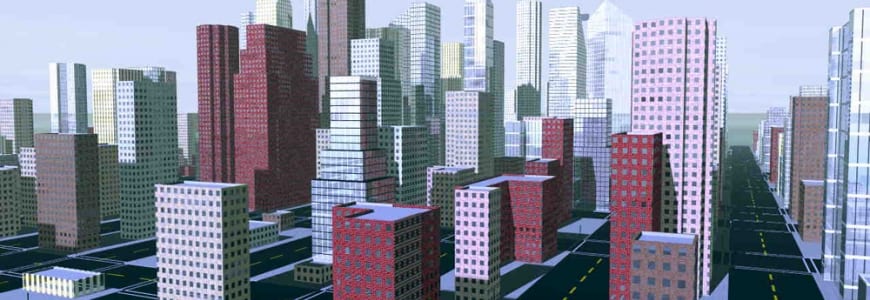By Rob Mitchum // October 23, 2013
Data and computation aren’t just changing how cities are run, they’re changing how cities are built. From new buildings and neighborhoods in the United States to entirely new megalopolises in the developing world, city planners and architects are using advanced data analytics and complex computer models to optimize the construction of new urban infrastructure. Many hope that these new methods can improve energy efficiency, transportation, and livability in new urban areas around the world, while helping to guard against the slums and poor logistics that result from unplanned urbanization.
These topics were on the table earlier this month at a Cities & Data Mining panel hosted by Architectural Record as part of their annual Innovation Conference. Charlie Catlett of the CI’s Urban Center for Computation and Data (UrbanCCD) spoke on the panel alongside Anthony Townsend of Instititue for the Future and Susan P. Crawford of the Benjamin N. Cardozo School of Law. Because the New York City audience was largely made up of architects, the panelists gave a broad overview of what data and computation means for the design of cities in terms of both real-time monitoring and long-term planning.
In his segment (starting at 23:00), Catlett discusses data-driven UrbanCCD projects with the Chicago Lakeside Development and the City of Chicago. As an illustration of what how city data can be transformed into quality of live improvements on an individual level, Catlett introduced the Data Science for Social Good project with the Cook County Land Bank that looked for abandoned or vacant properties ripe for reinvestment to improve the surrounding neighborhood.
“This is an example where we are using data from lots of different sources to try to understand the socioeconomic aspects of a city,” Catlett said. “Ultimately, what we want to do is bring to bear those models as well as the engineering and physical systems models to do a better job of forecasting if we make these sorts of zoning changes or these sorts of augmentations to public transportation, what that impact would be not just on the water and energy but also on the people.”
You can watch full video of the panel here. If you’re interested in hearing more about UrbanCCD and University of Chicago projects involving improving cities with data and computation, join us for the Chicago: City of Big Data panel on November 20th.

